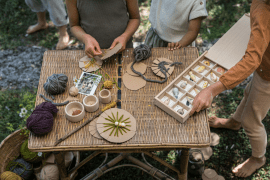By Megan Stonelake
There are some misconceptions about how parents discipline when they don’t use punishment. The assumption about discipline appears to be that parents either punish their children with violence and isolation or they don’t provide any boundaries whatsoever. This dichotomous thinking completely disregards respectful, empathic parenting strategies. Here are some tools to use in lieu of punishment:
1. Connection
The quality of the connection we have with our children is in direct proportion to their willingness to work with us. I used to think that using our relationship to get our children to cooperate was emotional manipulation. I’ve come to understand that it’s not that our relationship is a tool to get our way. Rather, focusing on our connection with our children enriches our lives while creating a secure attachment from which our children can grow and thrive. We don’t focus on our relationship with our kids so they will listen, we do it so they know we’re on the same team. And when kids know we’re on their side, they naturally want to work with us rather than against us. As Dr. Laura Markham informs us, “…your ability to enjoy your child may be the most important factor in his development…Children freely, even enthusiastically, cooperate when they believe we’re on their side.” (Peaceful Parents, Happy Kids).
2. Empathic reflection
There’s a whole host of reasons to provide empathic reflection when our children are expressing intense emotions. Reflecting their feelings in a compassionate way helps children to accurately identify their emotions as they arise and be more mindful of them. It also lets them know they’re understood. Plus, acknowledging the emotions often naturally diffuses them. We’ve likely all had the experience of someone truly listening to us and reflecting back what we’ve expressed. Knowing that someone has given us their undivided attention to listen and really hear us is invaluable.
3. Containment
Today I read a great quote from Rebecca Eanes of Positive Parenting: Toddlers and Beyond, “Meeting a child’s aggression with equal grown-up aggression only adds fuel to the fire. To extinguish aggressive behavior, meet it with calmness and compassion. Being calm isn’t passive – it’s mature.” Children need to know that we can provide a safe container for them – that if they begin kicking or throwing, we’ll physically keep them safe. What they don’t need is an adult who reacts with the same violence our children are learning to control. Containment can look like stopping a toddler from punching us or smacking the dog. In some instances containment is taking away a toy. It’s important to note that this isn’t done punitively but rather as a strategy to keep a child safe. It’s our job to create safe boundaries.
Containment also requires us to focus on the emotions underlying a behavior rather than simply addressing the behavior itself. Another quote from Rebecca Eanes illustrates this point: “When we only look at behavior, we stop seeing the child and only look with an intent to judge whether we need to reward or punish. When we look behind the behavior, we see that little struggling human, our little human, who needs our help with something.” As a parent, I’m less concerned with the behaviors than I am the thoughts and feelings driving them. As Alfie Kohn explains, “…behaviors are just the outward expression of feelings and thoughts, needs and intentions. In a nutshell, it’s the child who engages in a behavior, not just the behavior itself, that matters” (Unconditional Parenting).
4. Redirection
If we’re setting a limit, it’s helpful to also provide an alternative so our children know an acceptable option. We all fall into the trap of simply telling our kids, “no”. If we counted how many times we reject our children’s ideas or behaviors in a given day, we would likely be astonished. This doesn’t mean we don’t need to set appropriate limits, but it means we do so in a way that lets our kids know we strive to understand their needs and intentions. Rather than, “No throwing balls in the house!” We can say, “It isn’t safe to throw balls in the house. Let’s go outside and you can show me how you throw the ball!”
5. Consistency
When we enforce a rule one day and ignore it the next, our children will be confused about what’s expected of them. Similarly, when we’re compassionate in the morning and then punitive in the afternoon, we will erode trust and show our children that we discipline erratically and based on emotion. It’s a kid’s job to test boundaries. The less consistency we model, the more they will search to understand where our limits lie. Children thrive with clear, consistent boundaries rooted in empathy and respect.
6. Regulating Ourselves
One of the most important tools we can cultivate in parenting is discovering how to self-regulate. When we lash out at our children, we escalate an emotional situation rather than diffuse it. There are countless strategies, and what works for you might not work for another parent. Some of us practice counting to ten, for others texting a friend to vent helps. Creating a plan that you know will help you stay calm (or compose yourself if you’re already upset) will allow you to model emotion regulation for your children while responding to them with calm intention.
7. Relinquish Control Whenever Possible
Children have so little control over their environments. Often they can’t choose when they go to bed, what they eat, or where they go in a given day. It’s vital that we provide structure and boundaries for our children, but we must do so without micromanaging them. Giving our kids control in small ways can make them feel empowered and more willing to cooperate. In particular, children should feel the freedom to play entirely unencumbered by our expectations and agendas. So many of us struggle to allow our children to complete a puzzle without our hovering or paint a picture without our unnecessary suggestions. We might direct them in how to play on the playground or fix a problem for them when they’re struggling with a project. Stepping back and allowing creativity to flow will lead our children to feel more confident and capable.
As parents we can assume that our children are fundamentally good or inherently bad. Choosing to believe in the goodness of children means preserving their joyful spirits with respect and dignity rather than viewing them as “feral” creatures who require taming.
Megan Stonelake is a therapist and parent coach who teaches parents all over the world how to become more peaceful. She has written extensively on peaceful parenting for Parent.co, Hey Sigmund, and The Huffington Post among others. You can follow her blog or schedule a session at her website. You can also follow her on Facebook and Twitter.











